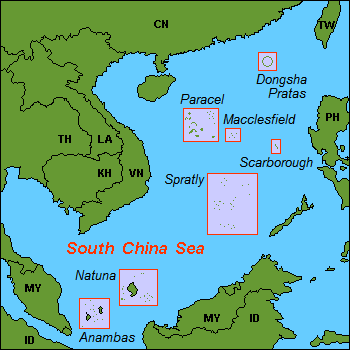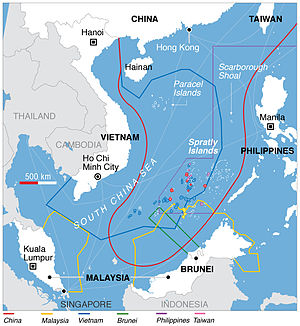by Robert Whitcomb | Sep 2, 2016 | News

Rectangles show disputed areas in South China Sea.
Philippine President Rodrigo Duterte said on Sept. 2 that China is building on another shoal in the South China Sea despite an international court ruling rejecting most of China’s claims in the resource-rich area. The Communist Party dictatorship of President Xi Jinping has been aggressively militarizing parts of the sea.
A U.N.-backed tribunal has ruled in July that China’s claims to almost all of the strategic sea had no legal basis and that its construction of artificial islands in disputed waters was illegal.
Mr. Duterte said he received an “unsettling” intelligence report showing China had sent barges to the contested Scarborough Shoal and had appeared to begin construction in the area for the first time.
China has already built artificial islands in the Spratly chain in the South China Sea. The United States has warned of unspecified “actions” if Beijing extended its military expansion to the Scarborough Shoal.
To read the Straits Times article on this, please hit this link.
by Robert Whitcomb | Sep 1, 2016 | News
Reuters reported that “A senior U.S. soldier said on Sept. 1 that Australia must choose between a stronger U.S. alliance or closer ties with China, and urged Canberra to take a tougher stance against Chinese claims in the South China Sea.
“The Pentagon, however, disputed the statement by U.S. Army Assistant Chief of Staff Colonel Tom Hanson, saying it did not represent the position of the U.S. government.
“I think the Australians need to make a choice … it’s very difficult to walk this fine line between balancing the alliance with the United States and the economic engagement with China,” Colonel Hanson said on Australian Broadcasting Corp. Radio.
“There’s going to have to be a decision as to which one is more of a vital national interest for Australia,” he said, adding that the comments reflected his personal view and were not necessarily that of the U.S. government.
“The idea that Australia, or any country, needs to choose between its longstanding ties to the United States and its emerging links with China presents a false choice,” U.S. Navy Commander Gary Ross, a Pentagon spokesman, said. . “Australia has strong, multifaceted ties with its Pacific neighbors, including China, just as we seek the same.”
Colonel Hanson’s comments came after a parliamentary booklet warned Australian lawmakers to treat Chinese motives in Asia-Pacific region with caution as Beijing moves, many observers think, to establish hegemony in the South China Sea
To read the entire article on this, please hit this link.
by Robert Whitcomb | Aug 26, 2016 | News
In a rare show of cooperation between the two superpowers, the U.S. Coast Guard conducted joint operations in the Pacific with its Chinese counterpart this summer, part of annual patrols to deter illegal fishing.
A U.S. Coast Guard spokesman said the USCG Mellon “rendezvoused and conducted a professional exchange” with two Chinese Coast Guard ships.
“The exchange focused on professional goodwill between coast guards,” U.S. Coast Guard District 17 spokesman Lt. Brian Dykens said. He added that the U.S. government has a “shiprider agreement” with China in which the U.S. Coast Guard vessel works with one or two Chinese Coast Guard ships.
Earlier this week, China’s official Xinhua News Agency said “cooperation between the two countries’ coast guards has deepened through personnel exchanges and joint operations.”
Xinhua also reported that the China Coast Guard plans to expand patrols in northern parts of the Pacific Ocean and deepen cooperation with the U.S. side.
The U.S., Japan and nations on the South China Sea have sought to counter Beijing’s militarized expansion into the South and East China seas.
To read The Japan Times’s story on this, please hit this link.
by Robert Whitcomb | Aug 3, 2016 | News
Japan’s annual defense review has expressed ”deep concern” over what it sees as China’s ”coercion” and aggressiveness, particularly in the South China Sea.
The review comes amid heightened tension in East and Southeast Asia less than a month after an arbitration court in the Hague invalidated China’s sweeping claims in the disputed South China Sea.
An increasingly aggressive and militaristic China refuses to recognize the ruling.
Japan fears that Chinese military bases being built on shoals and tiny islands in the sea will dangerously expand Beijing’s influence over a region through which $5 trillion in trade passes every year, much of it to and from Japanese ports.
And so, notes Reuters, Japan provides equipment and training to Southeast Asian nations, including the Philippines and Vietnam, that “are most opposed to China’s territorial ambitions.”
To read the article and see the accompanying video, please hit this link.
by Robert Whitcomb | Aug 1, 2016 | News
China’s increasingly aggressive military is pushing the nation’s also aggressive Communist political leadership to be willing to attack the U.S. and other nations that are pushing back against China’s attempt to take over the South China Sea through military threats. But so far, anyway, the government of President Xi Jinping has shown some wariness of provoking a direct armed clash with the United States.
China has called for a peaceful resolution of South China Sea disputes through talks at the same time as it continued to build up its military in the sea, especially by militarizing reefs and shoals.
To read a Japan Times article on this, please hit this link.
by Robert Whitcomb | Jul 29, 2016 | Initiative
Hackers, presumably directed by the Chinese government, have attacked the Web site of Vietnam’s two biggest airports and its national airline, Vietnam Airlines, with pro-Chinese messages about China’s attempts to take control of most of the South China Sea. The attacks come after a ruling by an international tribunal earlier in July in the Hague that China’s claims are almost entirely spurious.
Vietnamese state media said the hackers criticized the Philippines and Vietnam and their comparatively modest claims in the South China Sea.
Vietnamese officials said the hackers directed browsers to what Vietnam Airlines called “bad Web sites overseas”.
To read an Agence France-Presse article on this,
please hit this link.
by Robert Whitcomb | Jul 20, 2016 | News
Dictatorships tend to support other dictatorships in order, in part, to discourage democracy. Thus it was no surprise that the Syrian regime of Bashar Assad sides with China’s claim to virtually the entire South China Sea — in opposition to the decision of a nonpartisan international tribunal in the Hague that essentially said that China’s claim was bogus.
To read the statement from the Assad regime’s organ, please hit this link.
by Robert Whitcomb | Jul 18, 2016 | News
In a new show of muscle, China is closing part of the South China Sea for military exercises this week. The announcement comes after an international tribunal ruled against Beijing’s claim to own virtually the entire sea.
An area southeast of China Hainan island province will be closed until Thursday local time, but Beijing gave no details about the exercises.
The Japan Times reported: “Six governments claim territory in the South China Sea, although the area where the Chinese naval exercises are being held is not considered a particular hot spot. China’s navy and coast guard operate extensively throughout the South China Sea and regularly stage live firing exercises in the area.”
To read The Japan Times story, please hit this link.
by Robert Whitcomb | Jul 14, 2016 | News

Claims in the South China Sea. Note that China claims everything within the red line.
The ruling last week by an international tribunal in the Hague against China’s claims over most of the South China Sea has raised uncertainty and tension amongst those in shipping and international trade.
The very clear July 12 ruling could lead smaller Asian countries to be more assertive regarding their rights in these waters, which, in turn, could increase the number of incidents with an increasingly expansionist and aggressive China, which its neighbors consider a bully.
A big question is how much this will affect freedom of navigation in a sea through which goes 30 percent of world trade. The United States, for its part, has emphasized that it will do what is necessary to keep the shipping lanes open in the region.
To read a Wall Street Journal story on this, please hit this link.

